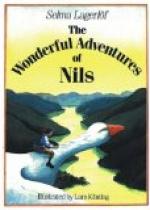But still he had kept up his courage as long as he had ridden through the air. And in the afternoon, when they had lighted under a little stunted pine, in the middle of a large morass, where all was wet, and all was cold; where some knolls were covered with snow, and others stood up naked in a puddle of half-melted ice-water, even then, he had not felt discouraged, but ran about in fine spirits, and hunted for cranberries and frozen whortleberries. But then came evening, and darkness sank down on them so close, that not even such eyes as the boy’s could see through it; and all the wilderness became so strangely grim and awful. The boy lay tucked in under the goosey-gander’s wing, but could not sleep because he was cold and wet. He heard such a lot of rustling and rattling and stealthy steps and menacing voices, that he was terror-stricken and didn’t know where he should go. He must go somewhere, where there was light and heat, if he wasn’t going to be entirely scared to death.
“If I should venture where there are human beings, just for this night?” thought the boy. “Only so I could sit by a fire for a moment, and get a little food. I could go back to the wild geese before sunrise.”
He crept from under the wing and slid down to the ground. He didn’t awaken either the goosey-gander or any of the other geese, but stole, silently and unobserved, through the morass.
He didn’t know exactly where on earth he was: if he was in Skane, in Smaland, or in Blekinge. But just before he had gotten down in the morass, he had caught a glimpse of a large village, and thither he directed his steps. It wasn’t long, either, before he discovered a road; and soon he was on the village street, which was long, and had planted trees on both sides, and was bordered with garden after garden.
The boy had come to one of the big cathedral towns, which are so common on the uplands, but can hardly be seen at all down in the plain.
The houses were of wood, and very prettily constructed. Most of them had gables and fronts, edged with carved mouldings, and glass doors, with here and there a coloured pane, opening on verandas. The walls were painted in light oil-colours; the doors and window-frames shone in blues and greens, and even in reds. While the boy walked about and viewed the houses, he could hear, all the way out to the road, how the people who sat in the warm cottages chattered and laughed. The words he could not distinguish, but he thought it was just lovely to hear human voices. “I wonder what they would say if I knocked and begged to be let in,” thought he.
This was, of course, what he had intended to do all along, but now that he saw the lighted windows, his fear of the darkness was gone. Instead, he felt again that shyness which always came over him now when he was near human beings. “I’ll take a look around the town for a while longer,” thought he, “before I ask anyone to take me in.”




